2024 ANNUAL REPORT



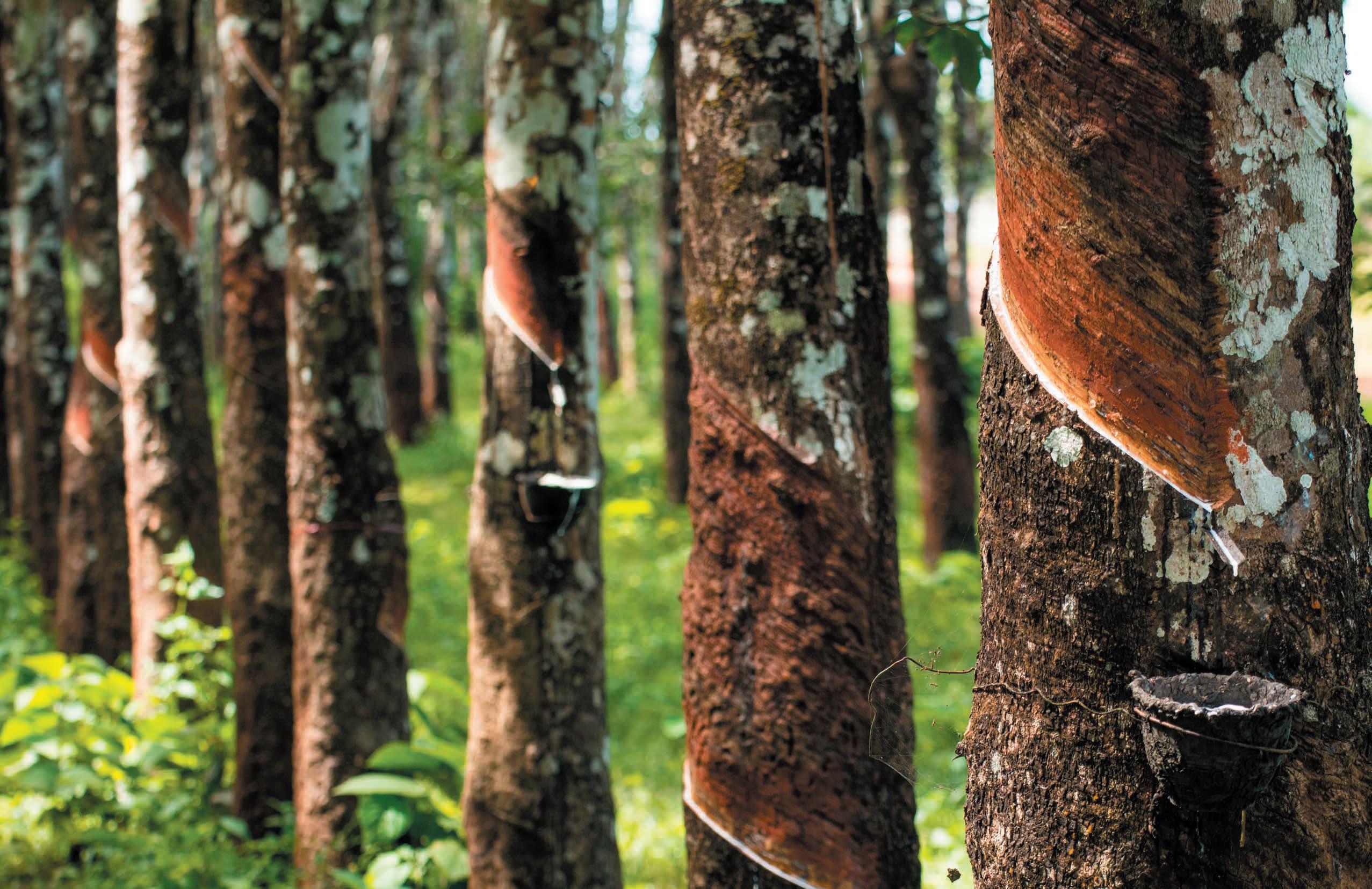
In 2024—and every year—our goal remains simple: to relentlessly focus on delivering for our customers and achieving meaningful environmental outcomes through our work. At eTracks, we began the year with a clear priority: addressing longstanding regulatory concerns related to the Ontario Tires Regulation 225/18 and the producer responsibility model. For several years, we raised the alarm about a statutory minimum collection requirement -- where
we achieved a significant milestone. In December 2024, the government introduced landmark amendments to the Tires Regulation, under the Resource Recovery and Circular Economy Act (RRCEA). These changes addressed impractical compliance expectations and represented a significant step forward in making Ontario’s tire recycling framework more effective and sustainable.
seriously—and to the eTracks team, whose scale, capabilities, and service excellence set us apart. Our mission is simple: when we solve complex challenges for our producer customers, we not only meet expectations—we create long-term value for the entire industry.
Our purpose as a not-for-profit tire PRO is to support a healthy recycling system that enables our customers to achieve compliance; where end-of-life tires are collected and repurposed into new, useful products. We deliver on this purpose by ensuring we maintain sustainable practices and financial commitments that benefit customers, the environment and Ontarians.
In 2024, Ontario tire producers were responsible for the collection, recycling and repurposing of 85% of the weight of the tires they sell into market under the Resource Recovery and Circular Economy Act (RRCEA). This amounted to a 100% collection requirement, as 15% is subtracted at the end of a tires life to account for wear.

However, the amendments were not , which became a key issue in 2025 when the Regulator sought to apply compliance standards to years that predated the changes.
This moment underscored a critical principle: for producer responsibility frameworks to succeed, the rules attainable and aligned . Only then can strong environmental outcomes at a fair cost be available to both
Despite these challenges, the truth tire recycling in Ontario is and recovery rates continue to rise year-over-year. Tires are being managed responsibly, efficiently, and in a manner that benefits the environment and
This success is a testament to the producers who take their responsibilities
As we move into 2025 and beyond, our commitment is unwavering. We will remain laser-focused on delivering exceptional service, innovating where it counts, and bringing the very best of eTracks to our partners, our communities, and our environment.
We are proud to support tire producers in meeting their environmental obligations. Knowing that our work helps keep communities cleaner, safer, and healthier is what motivates our team—and what drives me personally every day.
eTracks remains committed to transparency and open communication with its customers. Thank you for your continued trust in us. The future of tire recycling is bright, and we look forward to working together to make it even better.

STEVE MELDRUM, CEO eTracks Tire Management Systems
+716,000 TONNES COLLECTED THROUGHOUT ONTARIO

TONNES MADE INTO NEW AND USEFUL PRODUCTS
+618,000
Tires were the first of five material classes rolled out under the RRCEA in 2019, including, batteries, electronics, hazardous waste and Blue Box materials. In many instances, the classes that followed the Tires Regulation benefited from the example of tires and were amended to address implementation issues, while optimizing compliance outcomes.
A person or business is considered a tire producer under the RRCEA if they:
• are the brand holder of the tire and have residence in Canada.
• import tires from outside of Ontario and sell them in Ontario
• are the vehicle manufacturer and have residence in Canada.
• import new vehicles into Canada and sell them in Ontario
The Resource Productivity and Recovery Authority (RPRA) is the regulator mandated by the Government of Ontario to enforce the Tires Regulation and all of the province’s circular economy laws.


SOME OF THE PRODUCTS MADE FROM TIRES COLLECTED BY
• Hockey Pucks
• Rubber Mats, blasting mats, door mats, utility mats, & boot trays
• Landscaping Products & Accessories
• Clean lumber
• Turf
• Artificial grass
• Mulch (All applications, including landfill drainage chips, rubber landscape mulch)
• Sporting & Playground Surfaces
• Sporting & playground equipment
• Rubberized playground surfaces
• Calf taxi & barn supplies
• Golf course hybrid system
• Polyurethane binders
• Shock pads
• Flooring Products
• Including agricultural applications, rubberized asphalt, insulation, & tiles
• Crumb rubber
• Equipment
• Footwear
• Spikes
• Speed bumps, parking curbs, & sign bases
• Asphalt repair products
• Anchoring
• Concrete repair products
• Concrete admixtures & additives, concrete coatings, sealers & waterproofing
• Grouts, primers, & crack repairs
• Interior self-levellers
• Door & window insulation
• Adhesives & sealants
• Flooring
• Recycled tire flooring, epoxy flooring, wood floor bonding
For the sixth year in a row, all eTracks customers exceeded their 85% resource recovery target under the Tires Regulation 225/18 and achieved an all time high of 88% resource recovery.
Resource recovery refers to the total weight of materials ‘recovered’ from end-of-life (EOL) tires being recycled and re-used for an approved purpose. This tonnage is then divided by the total weight of all end-of-life (EOL) tires collected by eTracks in a calendar year.
This project involved the collection and delivery of 95 tonnes of used tires for track barriers at the new Porsche Experience track in Pickering Ontario. This tonnage counted as 100% collection and recovery for eTracks, and significantly contributed towards Porsche’s overall recycling obligation under the Tires Regulation. Learn more about the Porsche Experience!
• Increased the collection of large and giant off-the-road tires when mines came back online after COVID impacts had passed
• Diversified our ability to process tires by leveraging relationships with haulers to pre-process OTRs and then get that material into the processor
• Enhanced our ability to operate the network by continuing to build out our tire consolidation network
• Continued to address collection site issues through in-person visits and direct outreach to collectors in our network.
Throughout the year our team connects with collection sites and communities across Ontario to assess and ensure tires are being collected from all areas of the province. Remote and rural areas can be particularly challenging as tire collection sites can be harder to reach and more spread out compared to dense city centres. One of the ways we can test for tire accessibility in remote areas is through collection events, such as the one we held in Moonbeam, Ontario in July 2024.
Collection events involve collaboration with local communities to promote the event, find a location for tire drop off, and hiring a hauling company to manage the drop off area and assist members of the public with unloading their tires.
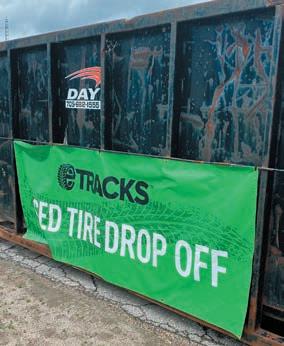

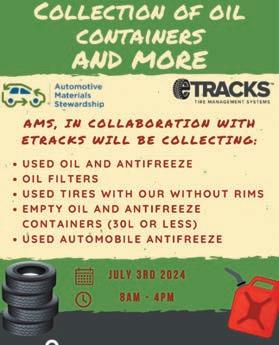
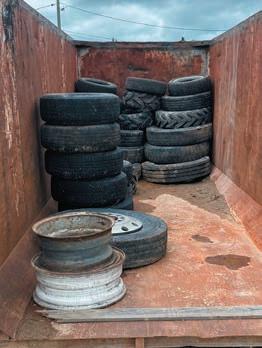
The Resource Recovery and Circular Economy Act (RRCEA) includes many essential objectives: protecting the natural environment and human health, fostering a more circular economy and minimizing waste by making producers responsible for the recovery of the products they manufacture and sell into the marketplace (ie. Individual Producer Responsibility (IPR) model).
It was a long journey, but in December 2024, we celebrated the new amendments announced under the RRCEA and specifically the Tires Regulation, effective January 1, 2025. In short, these amendments will help to ensure the targets are tough but achievable.
Beginning in June 2023 and running throughout 2024, eTracks advocated, alongside producers and industry associations to support meaningful regulatory change.
Our team met with the Ministry of Environment, Conservation and Parks (MECP) the Premier’s Office,
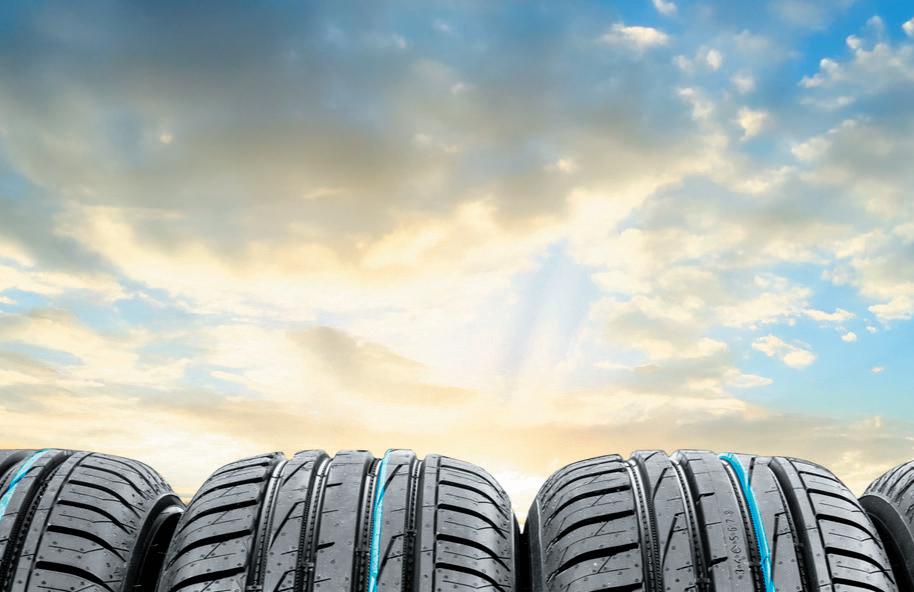
the Regulator, Tire Producers, Automakers, Industry Associations and other key stakeholders to discuss and collaborate on clear solutions to address a myriad of outdated and/or unachievable targets.
The amendments that passed legislature in 2024 were an open and clear recognition of a flawed regulation
SUMMARY OF COLLECTION NETWORK AMENDMENTS
• Below 500,000 population – 1 site for every 3000 people per municipality
• Over 500,000 population – 1 site for every 6000 people per municipality
• Sites can be shared between contiguous municipalities (can count for up to 10% of collection system)
• Collection Events can be used to address collection site shortfalls accounting for up to 25% of the collection system
• Delay from when census data is published to when it needs to be incorporated into targets.
(continued to page 9)
(continued from page 8)
A MANAGEMENT
The 100% Collection Requirement was changed to a Management Target at 65% of the weight sold to market based on a rolling 3, 4, 5-year average. This is more consistent with other material class regulations and acknowledges that there are not enough tires in Ontario for all producers to achieve a 100% collection requirement. eTracks will continue to ensure every available tire is collected for recycling, and that the focus of activities remains on positive environmental outcomes, efficiency and price stability for consumers and producers.
• Tire definition will increase from a minimum weight of >1kg to >5kg
• Haulers will now need to report only two categories of tires to RPRA: <700kg & >700kg
• Collection sites will no longer need to report or register with RPRA
• Determination of Small, Medium, Large producer will be based on supply weight, not obligation weight
• More dedicated efforts to service First Nations Communities in the far North where tire collection often requires special arrangements due to logistics, weather conditions and remote locations.
While the amendments were a positive step in the right direction, they were not retroactive. The result is that 2023 and 2024 performance evaluation will continue to have its challenges. We are committed to collaboration and working with the industry to ensure that Ontario’s tire recycling system continues to see improvements year over year.
We maintained our focus on price stability, and no price increases were introduced in 2024, with the same expectation for 2025. eTracks continues to strive for efficiencies in our supply chain to off-set inflationary pressures. Prices could be impacted in future by significant external factors in the current geopolitical situation and based on challenges in the industry environment.
The team continues to build best in class process and controls to streamline reporting and ensure strong analytical capability. Factors that support our foundation include strong cash management, risk management, strategic financial management, and excellence in reporting and analysis. This focus on continuous improvement has ensured a strong foundation as eTracks looks to the future. Planning for the future includes a robust budgeting and forecasting process and annual updates to our 5–7-year long range planning horizon.
Our team once again ensured a smooth audit of our 2024 financial statements. They also introduced an “Audit Ready” approach; working with customers to streamline the testing of tire recovery fee adjustments and supported in Tire Recovery Fee Reporting for RPRA requirements.
Our operations team works with a broad range of service providers to collect, haul and process tires from all corners of the province. We contract with over 65 Ontario hauling companies, who in turn employ roughly 580 haulers! These haulers provide tire collection services to locations from North to South and East to West ensuring the entire collection system is serviced.
Our team also works with many of Ontario’s processors in supporting a strong local economy. After extensive disruptions to processing capacity in 2023 – we looked for ways to ensure that no matter what happened in the industry, tires would keep moving and have a place to go. This led to a new relationship with Entech, a U.S. based processing plant. Entech helped to ensure tires kept moving - including
large, giant and passenger tires. While 90% of the tires we collect are processed in Ontario, about 10% went to Entech in 2024. Many of these were giant and off-theroad (OTR) tires which cannot be processed in Ontario.
• Entech, with its innovative approach to recycling and development of end markets helped increase our recovery rate.
• We continued to develop our tire consolidation network, which became a key element to managing the flow of tires with roughly ~4,800 tonnes going through our yards; these yards helped us maintain tire flow during times of disruption, and enabled us the breathing room to find additional processing options.
Each year we recognize our service providers for excellence in supporting a strong and sustainable tire recycling system, driving compliance and supporting our efforts to keep tires out of landfills.
Both hauling companies and collection sites were acknowledged in 2024. Each winner was sent prize packages for their drivers and staff, along with a framed certificate or plaque to showcase in their place of business.
eTracks manages tire flow activity through one integrated system. The Sustainable Recovery Platform (eSRP) is a powerful end-of-life tire track-and-trace system driving the tire industry’s digital transformation toward a more sustainable, circular future. Designed to support any organization involved in tire waste management— including government agencies, retailers, processors, tire manufacturers, automakers—eSRP delivers real-time, auditable insights into the movement of used tires from origin to final destination.
Launched in Ontario - January 2022 - eSRP has already facilitated the tracking of millions of used tires, with over 160,000 tire pick-ups and 60,000 deliveries, and supports a growing community of 9,000+ active users in Ontario and New Brunswick. Built for scalability, the platform is integrated with financial, communications, and reporting systems, offering flexible current and future-ready connectivity.
eSRP is available via the Apple App Store and Google Play and is fully cloud-based with integrations including Google Geolocation API, Google Maps API and Google Cloud Vision, ensuring a robust and efficient user experience.
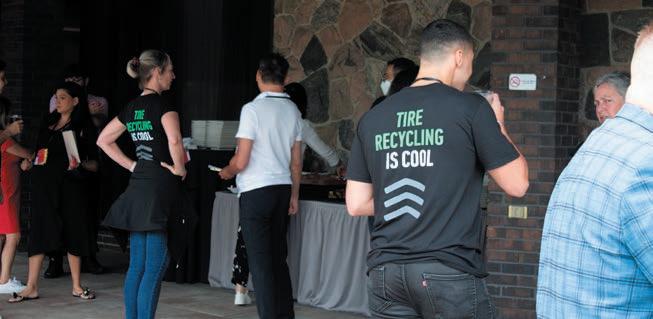
2ND ANNUAL HAULER SUMMIT - 1.5 DAY EVENT
We work with hundreds of haulers throughout the year! This event is a chance to connect in person and get a sense of what’s happening in the industry and how we can work better together and build on solutions.
We offered three educational sessions for attendees focused on operational improvements, sustainability and compliance.
Our event led to new partnerships and improvements to our service delivery model -- earning us a 100% satisfaction rating from attendees.
For the first time we hosted a producer appreciation event in honour of our valued customers! This was an informal opportunity for producers to meet with eTracks, our Board of Directors; and each other, to discuss recycling, compliance and make introductions. Our CEO, Steve Meldrum MC’d the event, and Mary Cummins, RPRA’s Regulator, said a few words to the industry in line with other regulatory guidance provided throughout the year.
It was truly a pleasure to put names to faces – and we look forward to repeating this event in future years!
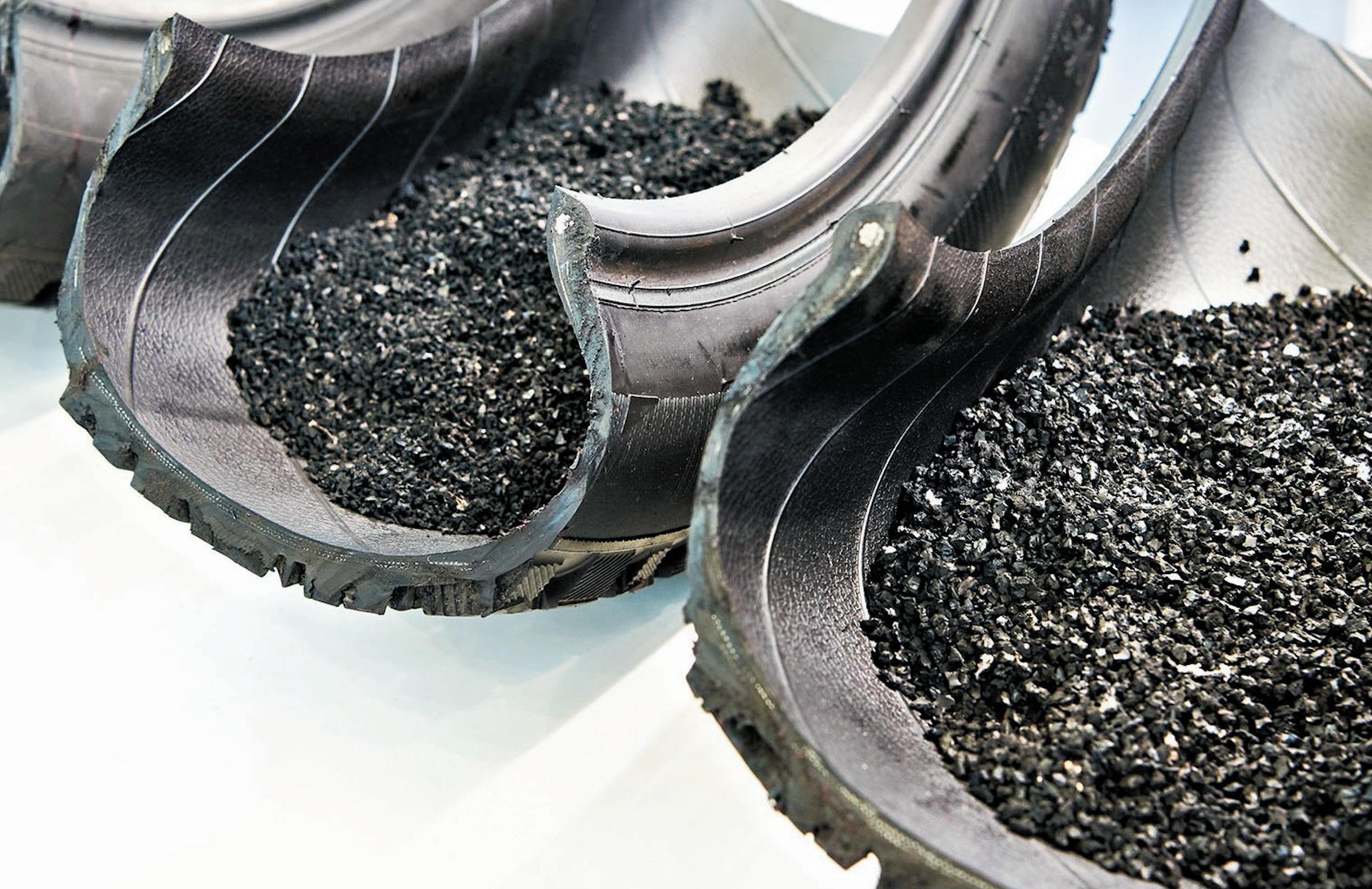
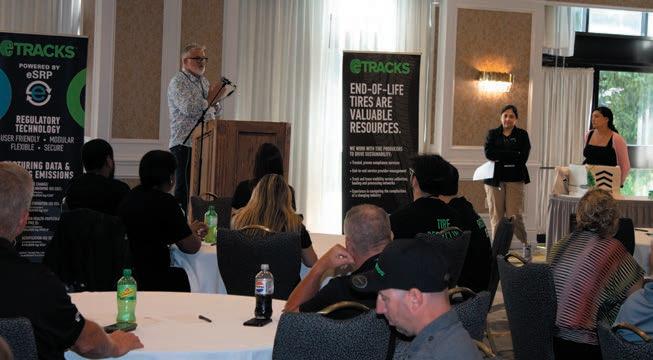
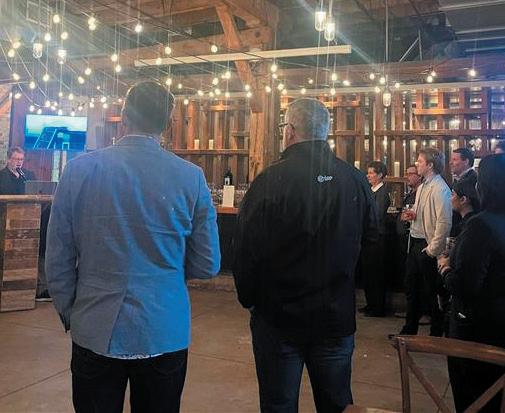
The Canadian Association of Tire Recycling Agencies (CATRA) conducted a Life Cycle Assessment (LCA) from 2019 to 2023, analyzing the environmental impacts and benefits of managing end-of-life tires.
*Participating CATRA members each receive a tailored report specific to the tire recycling data from their operations. The following is a summary of the most recent study using 2023 data, 2024 results will be available later in 2025
In 2023, eTracks’ operations contributed to significant environmental benefits through resource recovery, emissions avoidance, and supporting reduced dependency on virgin materials. The avoided impacts are quantified across seven key environmental categories using internationally recognized units of measure. Real-world equivalencies are provided where possible to help highlight these outcomes.
These avoided impacts are the result of a circular approach to materials management, which includes
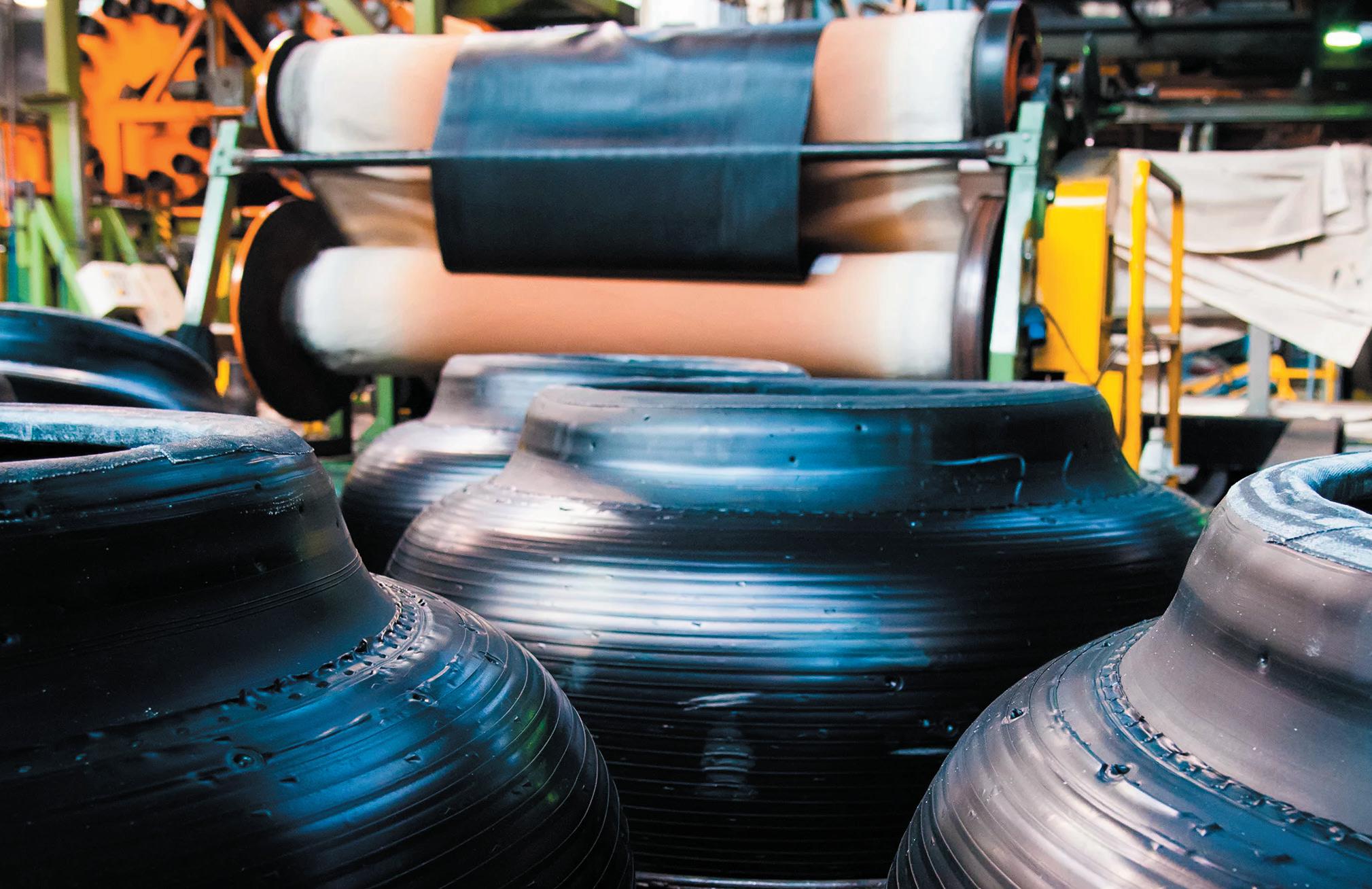
efficient tire recycling practices, reduced landfill use, and the recovery of valuable resources such as steel and rubber.
The Material Circularity Index (MCI) for eTracks’ tirederived products remained moderate to high at 0.58 reflecting strong circular economy performance.
The Material Circularity Index (MCI) is a metric developed by the Ellen MacArthur Foundation to measure how effectively a product or system utilizes materials in use and minimizes waste, by circular economy principles.
• How much virgin material is used to make a product.
• How much material is recycled or reused at end-of-life.
• How long the product lasts (its utility/durability).
• How well it is designed for recycling or reuse
Read the full 2023 Report
CATEGORY
Equivalent to avoiding 342 million km driven in private vehicles
Equivalent to avoiding 3.66 million hours of diesel loader operation
Equivalent to avoiding the burning of 76.7 million kg of coal
Mainly due to recycled steel displacing virgin steel production
CO₂e (carbon dioxide equivalent) aggregates all greenhouse gases based on their 100-year global warming potential (GWP).
O₃ equivalents represent ground-level ozone formation potential of precursor emissions.
PM2.5 refers to fine particulate matter that poses serious respiratory and cardiovascular health risks.
Cubic metres (m³) of freshwater represents the amount of consumptive water use avoided.
SO₂ equivalents quantify emissions that contribute to acid rain and soil degradation.
CFC-11 equivalents measure the relative depletion potential of emissions on the stratospheric ozone layer.
Nitrogen emissions (N) indicate nutrient loading that can cause harmful algal blooms and water system degradation.
Our efforts to recycle end-of-life tires in Ontario reduced more emissions than were generated, especially in producing higher-value products like crumb rubber for molded goods and asphalt. Regardless of fluctuations in collection and processing volumes, environmental efficiency remained high in 2023 compared to the LCA results from 2019 to 2022.
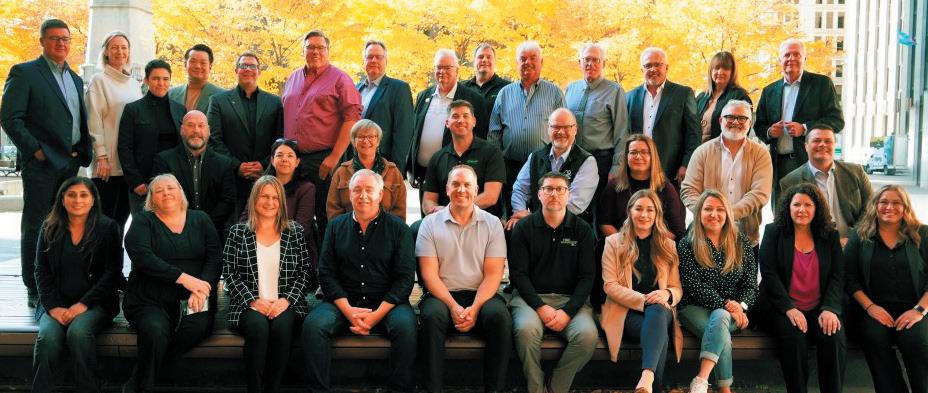
CANADIAN ASSOCIATION OF TIRE RECYCLING AGENCIES (CATRA), AGM
Our CEO, Steve Meldrum was the 2024 Chair of the Canadian Association of Tire Recycling Agencies (CATRA). Pictured above, members of CATRA attend the 2024 Annual Members Meeting, hosted by Recyc-Québec in Montreal, Quebec.
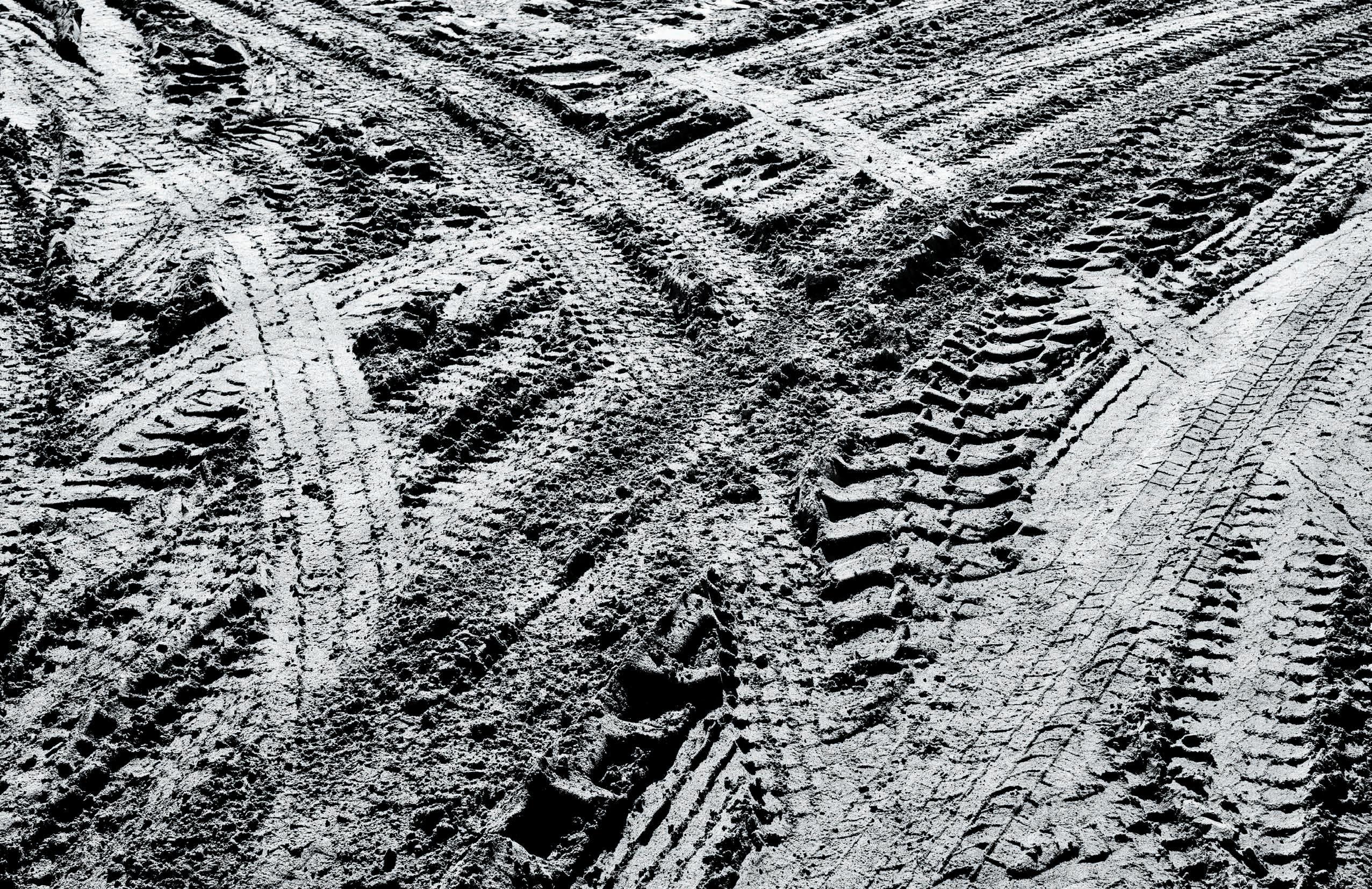
• Waste to Resource Ontario (W2RO), Annual Conferences
• Ontario Tire Dealership Association (OTDA) Golf tournament & Annual Fundraiser
